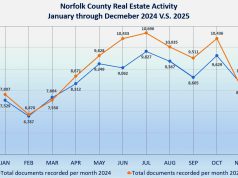Federal policies affect your daily life more than you may think. From how much healthcare you can access to what kind of reproductive care is available, national decisions often trickle down quickly. But what happens when those federal rules shift against your interests?
In less than 6 weeks, President Trump ended over $1.8 billion in National Institutes of Health grants. According to NBC News, between February 28 and April 8, the administration suspended nearly 700 aids across 24 NIH facilities and centers. These institutes studied subjects like aging, cancer, minor wellness, diabetes, psychological health, and developmental complications.
Now, Massachusetts faces the risk of losing $16 billion in federal funding. This could disrupt essential services like MassHealth, school meal programs, and special education. Governor Maura Healey has warned that Massachusetts’s $8 billion rainy-day fund cannot cover the shortfall, calling the potential damage “devastating” for working families.
Local leaders in Brookline are preparing for this very challenge. This article explains how Brookline’s leaders are responding and what this might mean for people countrywide.
Brookline’s Lawmakers Ready for Federal Pushback
Brookline’s state representatives are not waiting around. They have submitted more than 100 pieces of legislation before the January 17 deadline. This indicates their strong commitment to protecting your interests in the face of potential federal shifts.
Senator Cindy Creem, representing all of Brookline, is prioritizing your right to privacy, especially concerning healthcare and reproductive choices. She has already filed bill SD.501, aiming to stop companies from selling location data automatically collected by cell phones. This protection is vital for those seeking healthcare and other vulnerable populations.
Representative Greg Schwartz draws on his experience as a doctor. He is focusing on bills to improve healthcare quality and address the substance abuse infrastructure and primary care crisis. He also aims to secure more funding for public housing court defenders, showing a wide range of concerns for the community.
Representative Kevin Honan, a long-time leader on housing issues, is working on the cost-of-living crisis. He has filed bills related to housing, including tax relief for renters and increasing affordable housing options. Honan is also concerned about potential federal funding cuts to crucial social programs, like Medicare and SNAP, as well as to medical research.
You might question why this matters to you. The answer is simple: When federal policies roll back rights, state leaders become the first line of defense. Brookline’s efforts highlight how local action can keep healthcare accessible, protect personal data, and address crucial community needs, even in challenging political times.
The Overlooked Impact of Federal Cuts on Local Public Health Programs
One major concern among Brookline officials is the risk of losing federal funding for public health programs. In April, Brookline public health leaders laid out a local strategy to prepare for these funding cuts. They are preparing to maintain essential services, like vaccinations, mental health support, and emergency preparedness, even with fewer federal dollars.
This is particularly critical because these programs are not just “extras.” They’re the foundation of community health. If funding disappears, towns must either cover the cost or let services crumble. As Brookline clinics adapt to shifting funding realities, there’s also a growing emphasis on making reproductive care more transparent and compassionate.
For instance, in May 2024, Planned Parenthood centers across Massachusetts introduced pain relief options for IUD insertions. This move aims to ease patient anxieties and expand access. This push for more humane care comes when many women are reevaluating long-term contraceptives due to legal challenges like the Paragard lawsuit.
The suit highlights allegations of device-related injuries and inadequate risk disclosures. TorHoerman Law reveals that over 3,300 lawsuits are underway in a federal court. Additionally, over 7,000 severe device-related reports have been registered in the FDA’s Adverse Event Reporting System.
These developments underscore the need for state-level protections, especially when federal safeguards feel uncertain. These changes extend far beyond Brookline. Should federal funding cuts reach other states, similar resource reductions may occur in your town.
This highlights the importance of local planning initiatives, such as the one underway in Brookline.
Building Local Support When Federal Funding Disappears
Brookline’s approach is not just reactive, it’s strategic. To future-proof community health, local leaders are building systems designed to withstand federal uncertainty, like the town’s new Community Health Improvement Plan.
The plan targets four main areas, namely financial security, access to social and healthcare solutions, low-cost accommodation, and mental health support. Sigalle Reiss runs the town’s public health department. She explains that these federal cuts might not lead to immediate staff losses, but their ripple effects are still significant.
However, the cuts could reduce state grants and hurt local nonprofit partners. Regardless, Reiss believes the department would still have to halt some of the state’s exciting public health work. The department may need to focus on basic services rather than new programs.
To help maintain these services, the Friends of Brookline Public Health raised $3,812 last fall. This money supports school health services and the local food pantry. Community donations help fill gaps when federal funding disappears. Nicole Huberfeld teaches health law at Boston University, advising local officials on “cost-efficient” rather than “cost-saving” programs.
Public health does not run on scraps; it needs real investment to do its job. That’s why smart, thoughtful spending matters more than simply slashing costs. To prioritize health equity, the town plans to hire diverse social workers who reflect and understand the cultures they serve. This approach helps historically underserved communities get better support.
People Also Ask
1. How can federal funding cuts impact essential local health services?
Federal funding reductions could significantly affect vital local health services. This may include reduced support for programs like vaccinations, mental health services, and emergency preparedness initiatives. Communities might face difficult choices about which services to maintain or cut back on.
2. What can towns and cities nationwide learn from Brookline’s approach to these potential cuts?
Other communities can learn the importance of early planning, engaging residents, and identifying local resources. Focusing on community needs and exploring diverse funding options, beyond just federal aid, can help build resilience in the face of uncertain federal policies.
3. Why is it important for towns to plan for federal policy shifts?
Federal policy shifts can quickly disrupt essential services like healthcare, education, and food security. Towns that plan early can protect residents from disruptions. Prepared communities are better equipped to maintain quality of life, especially for those who rely on public programs or safety nets.
Brookline shows that local action matters. Instead of waiting for federal shifts, leaders are stepping up to protect services and drive state policy forward. They are planning, protecting services, and pushing for stronger state laws. This approach does not just help one Massachusetts town. It sets an example for others.
You do not have to live in Brookline to learn from it. If your town has not started planning for federal policy shifts, now is the time to ask why. Because when national protections weaken, the only safety net left may be the one your community builds.
















